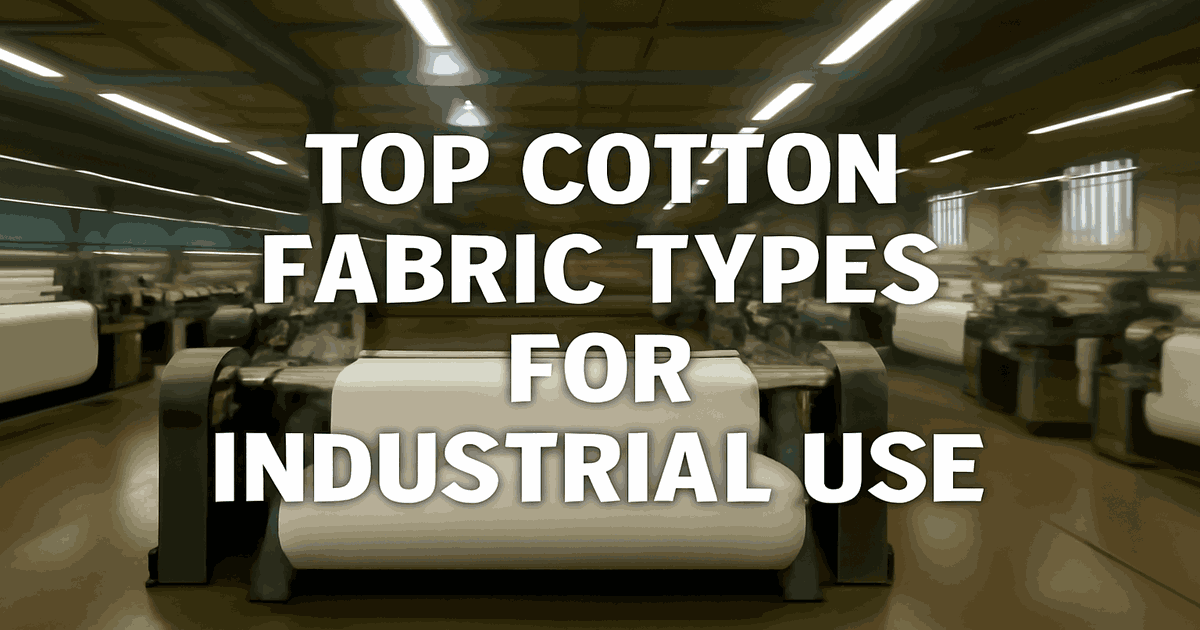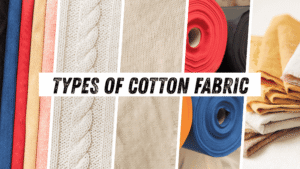- Home
- About
- Products
Single Fill Duck
Army Duck Fabric
Numbered Duck
- 200 GSM Cotton Polyester Mix Canvas Fabric
- 220 GSM Cotton Polyester Mix Canvas Fabric
- 290 GSM Cotton Polyester Mix Canvas Fabric
- 295 GSM Cotton Polyester Mix Canvas Fabric
- 315 GSM Cotton Polyester Mix Canvas Fabric
- 375 GSM Cotton Polyester Mix Canvas Fabric
- 390 GSM Cotton Polyester Mix Canvas Fabric
- 470 GSM Cotton Polyester Mix Canvas Fabric
- Eco Weav
- Re Weav
- Certificates
- Contact Us
Types of Cotton Fabric: A Complete Guide for Manufacturers

Table of Contents
Understanding the types of cotton fabric is crucial for manufacturers seeking quality textiles that meet specific performance and aesthetic requirements. From lightweight plains to heavy-duty drills, each fabric brings unique characteristics in weave, GSM, and application suitability.
At Radhey Krishna Cotweaving, we leverage decades of experience to deliver tailored solutions—ranging from luxurious 100% cotton to durable cotton drill—all manufactured in-house with strict quality controls. Whether you’re producing casual wear, industrial textiles, or soft home furnishings, our expertise ensures optimal fabric selection. Our deep commitment to certification, flexible production capabilities, and reliable logistics positions us as India’s premier cotton fabric supplier.
Types of Cotton Fabric and Their Industrial Applications

- 100% Cotton Fabric: 100% cotton fabric is made entirely from natural cotton fibres, making it one of the most preferred choices across the textile industry. Its breathable, soft, and hypoallergenic nature suits a wide range of applications, especially in the fashion, home textile, and garment sectors. This fabric is highly absorbent, comfortable on the skin, and easy to dye, allowing vibrant and long-lasting colours. It is used extensively in making casual wear such as T-shirts and shirts, as well as home textiles like pillow covers and bed sheets. Its biodegradable properties also appeal to eco-conscious manufacturers aiming to reduce synthetic fibre usage.
- Cotton Canvas Fabric: Cotton canvas fabric is known for its strength and coarse texture, owing to its heavy, plain-weave construction. It is a robust material that can withstand significant wear and tear, making it a practical choice for applications that require resilience. Traditionally used in sails and tents, cotton canvas has evolved into a versatile textile now seen in bags, footwear, upholstery, and even jackets. The tight weave offers dimensional stability, while the natural cotton fibres allow for breathability. It also holds up well to dyeing and printing processes, making it ideal for products where both function and design are important. Manufacturers value its long life cycle, even with frequent use.
- Duck Fabric: Duck fabric, sometimes called duck canvas, is a tightly woven cotton fabric with a weave that is even denser than traditional canvas. Its structure typically involves two warp yarns over a single weft yarn, resulting in a smoother and flatter finish compared to standard canvas. This makes it suitable for rugged, industrial-grade products such as workwear, tool bags, and tarpaulins. The compact weave also provides natural water resistance, which can be enhanced through chemical treatments, making duck fabric highly desirable for outdoor applications. Its stiffness and strength make it ideal for situations that demand both flexibility and heavy-duty performance, especially in high-friction environments.
- Plain Cotton Fabric: Plain cotton fabric is the simplest form of cotton weave and one of the most widely used across textile categories. Its over-under weave pattern creates a balanced, smooth surface that is breathable and lightweight. Plain cotton is particularly popular in the apparel industry, where it is used to make shirts, dresses, and children’s clothing due to its soft texture and skin-friendly properties. In the home textile segment, it finds use in tablecloths, napkins, and curtains. Easy to wash, quick to dry, and low on maintenance, this fabric type is not only cost-effective but also offers ample flexibility for printing, embroidery, and other value-added processes in manufacturing.
- Cotton Twill Fabric: Cotton twill fabric is distinguished by its diagonal rib pattern, resulting from a specific weaving technique where weft threads pass over one or more warp threads before going under two or more. This creates a soft drape and a durable surface that resists wrinkles and hides stains more effectively than plain weaves. Twill is used extensively in garments like chinos, trousers, and jackets, as well as in industrial uniforms and workwear. It offers a professional finish while maintaining comfort and flexibility, making it a top choice for manufacturers seeking both aesthetics and strength in a single material. The structure also allows it to retain shape well during heavy use.
- Cotton Drill Fabric: Cotton drill fabric is a heavier, more robust version of twill, designed for extreme durability. This dense diagonal weave makes it highly resistant to abrasion and wear, which is why it is a go-to fabric for uniforms, protective workwear, and military clothing. Its thickness and rigidity provide structural integrity without compromising comfort, as it still retains the breathability and softness of natural cotton. Cotton drill can be mercerised for added lustre and shrink-resistance, and it holds up well to repeated washing and heavy-duty use. It is also used in accessories like tool belts and aprons. For manufacturers, drill fabric offers longevity, strength, and reliable performance across challenging environments.
Comparison Table: Types of Cotton Fabric at a Glance
Fabric Type | Weave / Weight | Ideal Uses | Key Benefits |
|---|---|---|---|
100% Cotton | Plain; light to heavy | Casual wear, innerwear, bedding | Soft, breathable, natural |
Canvas | Plain; heavy | Bags, tents, upholstery | Durable, strong, holds shape |
Duck | Tight plain; heavy | Industrial wear, covers, sandbags | Rugged, waterproof (after treatment) |
Plain Cotton | Simple plain, light | Shirts, dresses, quilting, home linens | Lightweight, breathable, affordable |
Twill | Diagonal; medium-heavy | Chinos, jackets, uniforms | Sturdy, wrinkle-resistant, elegant look |
Drill | Heavy twill | Uniforms, workwear, outdoor gear | Abrasion-resistant, long-lasting |
Why Choose Radhey Krishna Cotweaving?
Radhey Krishna Cotweaving is a trusted name in India’s textile manufacturing sector, offering a wide range of cotton fabrics tailored to meet diverse production needs. Our manufacturing plant supports GSM ranges from 50 to 500 and can produce widths up to 120 inches, accommodating everything from lightweight fabrics to heavyweight industrial textiles.
We work with various fibre compositions, including 100% cotton, poly-cotton blends, recycled cotton, organic fibres. Our in-house capabilities span canvas, twill, drill, dobby, and plain weaves, allowing for customisation based on exact product specifications.
Our facility is certified with GOTS, GRS, and OEKO-TEX standards, and we maintain strict compliance with export standardisation protocols. Each fabric roll undergoes 100% roll-to-roll inspection and rigorous in-house lab testing to ensure consistency and durability. Whether you require small sample runs or full-scale production, our team supports flexible MOQs, rapid prototyping, and end-to-end delivery—including export facilitation and doorstep logistics across India and globally. Our reputation has been built on delivering reliable, high-performance cotton fabrics to manufacturers who demand nothing but the best.
Final Thoughts
From everyday garments to industrial applications, choosing the right cotton fabric is essential for performance, durability, and comfort. By understanding the differences between 100% cotton, canvas, duck, plain weave, twill, and drill, manufacturers can make informed decisions that enhance product quality. Radhey Krishna Cotweaving-Best Cotton fabric manufacturer in India combines fabric innovation with strict quality standards, offering a complete solution for your cotton fabric needs. For reliable bulk supply, certified quality, and flexible service, partner with us—India’s trusted name in cotton fabric manufacturing.
Contact us today to request a quote or discuss your bulk fabric requirements with our expert team.
FAQs
What are your minimum order quantities (MOQ)?
We offer flexible MOQs starting as low as 100 metres for bulk orders, and smaller quantities for sample rolls. This allows manufacturers to align procurement with production requirements while minimising inventory costs.
Can I request fabric samples before ordering?
Yes, manufacturers can request sample metres or swatches before committing to bulk. This helps evaluate texture, weight, dye consistency, and performance against your product specifications, ensuring the selected fabric meets production standards.
What is the lead time from order to delivery?
Lead time varies by fabric type, quantities and customisation, typically ranging from two to six weeks. Prior stock and production schedules may impact delivery timelines; we provide accurate estimates upfront.
Can you customise fabric GSM and width?
Yes, we manufacture cotton fabrics ranging from 50 to 500 GSM and widths up to 120 inches. This flexibility allows precise engineering of fabrics for garments, upholstery and industrial applications without compromising yield.
What certifications do your cotton fabrics have?
Our cotton fabrics are certified under GOTS, GRS, OEKO-TEX, and comply with BIS standards. These credentials guarantee sustainability, recycled content, and absence of harmful substances—critical for global manufacturing compliance and eco-conscious brands.
Do you conduct textile testing for quality assurance?
Yes, we perform comprehensive testing—including GSM, tensile strength, colorfastness, shrinkage, and dimensional stability—using in-house labs and standard test methods. This ensures consistent quality and performance for bulk production.
What payment terms and pricing structure do you offer?
We offer competitive fabric pricing, transparent breakdowns, and flexible payment plans including partial upfront and balance on delivery. Pricing considers quantity, customisation, finishing, certifications, and shipping costs, helping manufacturers manage budgets effectively.

